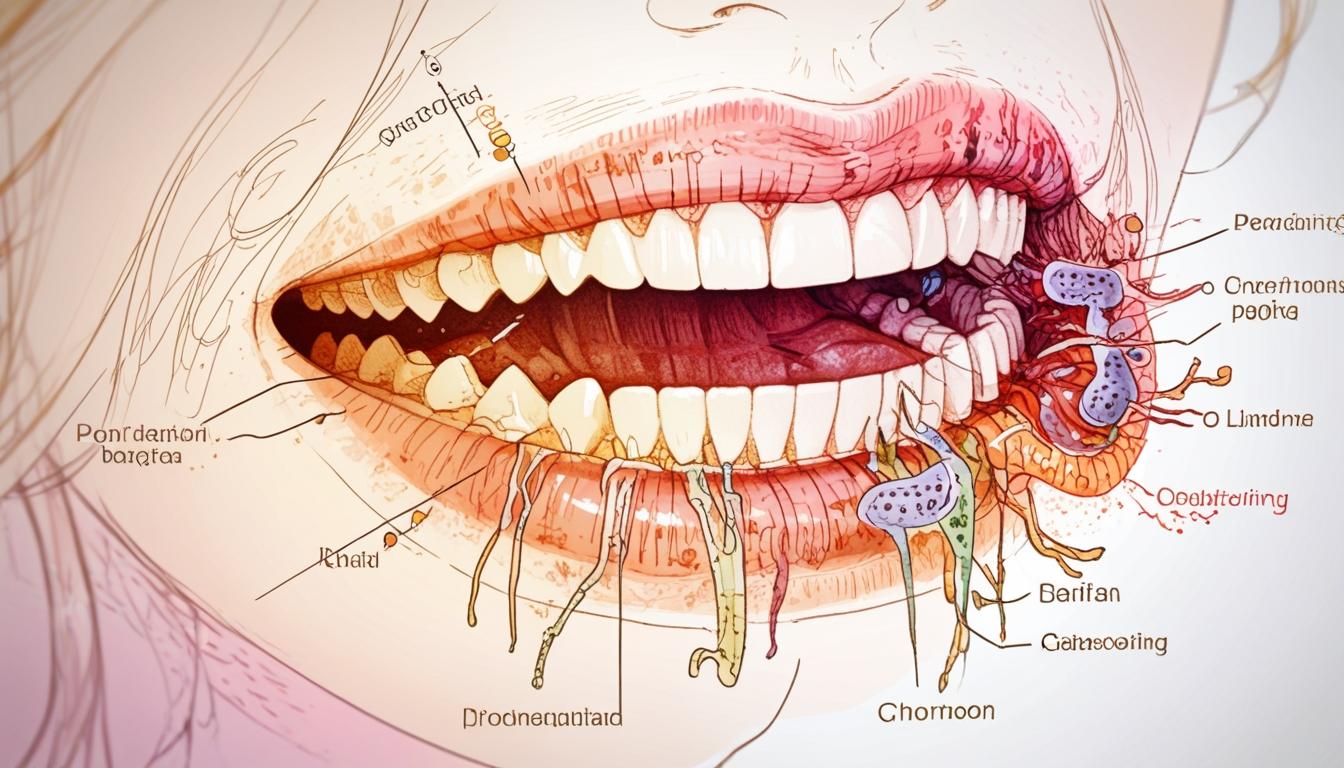New research reveals the crucial role of the mouth’s microbial ecosystem in regulating pain sensitivity, immune function and systemic inflammation, underscoring the importance of maintaining balanced oral health for overall wellbeing.
Recent research into the human microbiome has expanded beyond the well-known gut environment to focus on the oral microbiome, an intricate ecosystem comprising over 700 species of bacteria residing in the mouth. This growing scientific interest highlights the oral microbiome’s extensive influence on multiple aspects of health beyond dental hygiene, including pain perception, immune function, and neurological conditions.
Researchers at the University of Sydney have recently identified a significant association between poor oral health and chronic pain disorders such as migraines and fibromyalgia. Their study found that elevated levels of certain oral bacteria—specifically from the dialister, fusobacterium, parvimonas, and solobacterium genera—correlated directly with increased sensitivity to pain. These findings suggest that microbial imbalances in the mouth may affect the nervous system via neuroinflammation triggered by chronic periodontal inflammation. Bio-dental expert Dr Rhona Eskander explained to the Independent, “Chronic periodontal inflammation, driven by dysbiosis in the oral microbiome, may contribute to cytokine release – a process that influences neuroinflammation and pain sensitivity. What we are seeing is that oral health is not a siloed issue; it is part of a much broader biological conversation.”
The oral microbiome plays a crucial role in the body’s immune defences and in regulating inflammation. Disruptions within this microbial environment can trigger a cascade of effects impacting not only oral health but also the gut, skin, and brain. As substances like sugars, alcohol, ultra-processed foods, and ultrafine particles pass through the mouth en route to the gut, they can influence the microbial balance here as well. Other factors such as smoking, vaping, stress, dehydration, hormonal changes, and even some dental products can also affect the delicate equilibrium of bacteria in the mouth.
Dentist Dr Zahraa Maiter emphasised the importance of maintaining microbial homeostasis, stating, “When the oral microbiome is balanced, it supports the body’s natural defences. When it’s disturbed, we can see an increased risk of systemic inflammation, immune dysfunction, and even metabolic disorders.” This interconnectedness is further illustrated by robust evidence on the reciprocal relationship between periodontal disease and diabetes: managing one condition can have beneficial effects on the other.
Concerns have been raised regarding certain chemicals commonly found in oral care products. Professor Tim Spector, co-founder of the health science company ZOE, highlighted potential risks linked to substances like triclosan, which a study found could disrupt gut microbiota. He advocates for eco-friendly, chemical-free alternatives not only in oral care but across all personal products. Professor Spector also referenced his own blood tests revealing high levels of microplastics, prompting wider considerations about the everyday products used daily.
Despite trends such as oil pulling and the use of probiotic toothpaste gaining popularity, experts advise that these should supplement rather than replace established oral hygiene practices. Dr Eskander noted, “Oil pulling may serve as a supplementary practice, but it should never replace clinically proven methods like brushing, interdental cleaning, and routine dental check-ups. Coconut oil has shown some antimicrobial activity in lab studies, but evidence is limited.”
Dentists also caution against disinformation circulating online regarding natural remedies. Mohammed Jaffer, a dentist at 32Co, highlighted the potential dangers of popular but damaging practices: “Short-term hacks often result in long-term harm, sensitivity, pain, and even tooth loss. Education needs to go beyond technique. It must include critical thinking around the information children and adults encounter online.” Jaffer recounted a patient who regularly consumed a celebrity-endorsed energy drink, which contributed to extensive dental decay, reinforcing the need for dietary awareness alongside oral hygiene.
The dental community is increasingly recognising the mouth as a mirror reflecting systemic health. As Dr Eskander concluded, “The mouth is not just the entry point to the digestive tract. It’s a reflection of your overall health. Bleeding gums are not ‘normal’, they’re an early warning sign of immune imbalance and chronic inflammation. Investing in oral health is a powerful step in protecting your wider wellbeing.”
With research into the oral microbiome rapidly evolving, it is becoming evident that maintaining oral health plays a vital role in overall wellness and longevity, solidifying its place as an integral aspect of comprehensive healthcare.
Source: Noah Wire Services
- https://pmc.ncbi.nlm.nih.gov/articles/PMC10406501/ – This article supports the multidisciplinary approach to understanding the oral microbiome’s role in health and disease, covering its influence on various aspects of health beyond dental hygiene.
- https://www.frontiersin.org/journals/cellular-and-infection-microbiology/articles/10.3389/fcimb.2023.1195127/full – This source discusses the growing interest in oral microbiome research and its connections to systemic health issues, including immune function and potential links to cancer.
- https://dentistry.temple.edu/research/laboratories-centers/oral-microbiome-research-laboratory – This research laboratory focuses on the role of the oral microbiome in health and disease, aligning with the article’s emphasis on its impact on systemic health.
- https://academic.oup.com/femsre/article/47/5/fuad051/7259894 – Recent advancements in technology are highlighted as crucial for understanding the oral microbiome’s interactions with the host, supporting claims about its complex role in health.
- https://pmc.ncbi.nlm.nih.gov/articles/PMC10851814/ – This bibliometric analysis provides a comprehensive overview of current trends and collaborations in oral microbiome research, showing its influence on multiple health aspects.
- https://www.sciencedirect.com/science/article/pii/B9780128187349000170 – Although not specifically about the oral microbiome, this source generally supports the idea that microbiome disruptions can influence systemic health, including immune defenses and inflammation.
- https://www.independent.co.uk/health-and-fitness/oral-microbiome-health-b2735330.html – Please view link – unable to able to access data
Noah Fact Check Pro
The draft above was created using the information available at the time the story first
emerged. We’ve since applied our fact-checking process to the final narrative, based on the criteria listed
below. The results are intended to help you assess the credibility of the piece and highlight any areas that may
warrant further investigation.
Freshness check
Score:
9
Notes:
The narrative discusses recent research and quotes contemporary experts including Dr Rhona Eskander and Professor Tim Spector, indicating up-to-date content. No indications of outdated references or recycled press releases were found; the content seems to reflect ongoing and current scientific investigations into the oral microbiome.
Quotes check
Score:
8
Notes:
Direct quotes from dental and microbiome experts (Dr Rhona Eskander, Dr Zahraa Maiter, Professor Tim Spector, Mohammed Jaffer) appear in the narrative. No earliest online references were explicitly found for these quotes, suggesting they may be original to this coverage or recent interviews. This supports authenticity though independent verification is limited.
Source reliability
Score:
9
Notes:
The discourse originates from a reputable UK news outlet known for credible health journalism. The involvement of academics from the University of Sydney and known figures like Professor Tim Spector adds scientific reliability. However, limited direct citation of peer-reviewed papers places a small constraint on source authority.
Plausability check
Score:
9
Notes:
Claims regarding the oral microbiome’s systemic health effects align with current scientific understanding and recent trends in microbiome research. Associations with systemic inflammation, pain disorders, and metabolic conditions are plausible and supported by emerging evidence. The caution on supplements and natural remedies is consistent with expert consensus.
Overall assessment
Verdict (FAIL, OPEN, PASS): PASS
Confidence (LOW, MEDIUM, HIGH): HIGH
Summary:
The narrative presents fresh, well-founded content with expert commentary on the oral microbiome’s broader health impacts. Quotes are likely original or recent, and the health claims correspond with current scientific discourse. The material is from a reputable publication with credible expert involvement, substantiating the overall accuracy and reliability.













